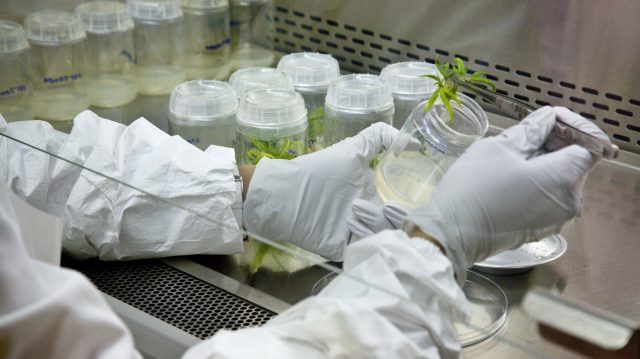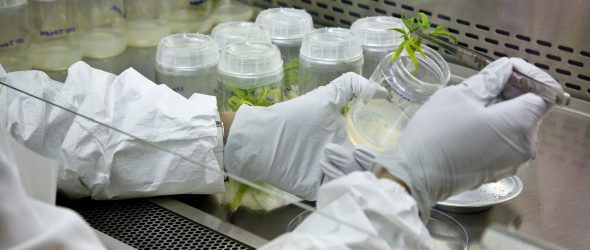
A researcher propagates cannabis plants at the UM School of Pharmacy’s Marijuana Project. The university has licensed two new drug candidates that may provide nonaddictive pain management, prevent blindness and alleviate the threat of irreversible vision loss from glaucoma and other eye diseases. Photo by Robert Jordan/Ole Miss Digital Imaging Services
OXFORD, Miss. – The cannabis research program at the University of Mississippi School of Pharmacy has partnered with pharmaceutical company Emerald Bioscience Inc. to license two new drug technologies that may provide nonaddictive pain management, prevent blindness and alleviate the threat of irreversible vision loss from glaucoma and other eye diseases.
The two drug candidate formulations include a synthetic prodrug of tetrahydrocannabinol, commonly known as THC, the main psychoactive compound associated with marijuana, and a synthetic analog of cannabidiol another compound that is attracting widespread attention as a potential treatment for a variety of medical conditions. Both drug candidates are derivatives of the natural THC and CBD found in the cannabis plant.
The CBD analog, developed by UM and ElSohly Laboratories Inc., a small business and drug development company in Oxford, has potential to be used as a pain reliever that is equivalent or more effective than opioids.
A multidisciplinary team led by Ken Sufka, Ole Miss professor of psychology, pharmacology and philosophy, demonstrated that this synthetic form of CBD provides analgesic pain relief comparable to opioids when treating a condition known as chemotherapy-induced neuropathy, or CIN, in a validated animal model of the condition. The CBD analog provided pain relief for this debilitating condition caused by chemotherapy that, importantly, did not come with the risk of addiction.
“When a patient with CIN cannot tolerate opioids, they often must decide to stop chemotherapy altogether, meaning they are rolling the dice on whether they have had enough chemo to be tumor-free,” Sufka said. “Our team believes this novel CBD compound can fully manage neuropathic pain and change the quality of life for those coping with cancer treatment.”
The U.S. Drug Enforcement Administration deemed this therapeutic candidate not to be a controlled substance, making it more widely available to diverse populations and testing sites within the United States.

The university cultivates and produces cannabis products as part of a contract with the National Institute on Drug Abuse. UM researchers also have been studying compounds found in the plants as a source for potential drug candidates to relieve pain and treat a variety of conditions. Photo by Robert Jordan/Ole Miss Digital Imaging Services
The second drug candidate, the THC prodrug, is an inactive form of THC that becomes activated when absorbed into the body. Along with Emerald Bioscience, Ole Miss and ELI researchers developed a THC prodrug to treat glaucoma that can be absorbed through the tissues in the eye after a simple eyedrop application.
“Getting to this pivotal point took almost 10 years,” said Soumyajit Majumdar, professor of pharmaceutics and drug delivery and leader of the THC prodrug research team. “The Ole Miss and ELI research teams developed many iterations of the THC prodrug, balancing the characteristics of the compounds to come up with a molecule and an ophthalmic formulation that has the optimal characteristics to treat glaucoma effectively.”
Researchers at the university have published numerous peer-reviewed papers related to these findings in Planta Medica and Medical Cannabis and Cannabinoids, the Journal of Pharmaceutical Sciences and others.
The decision for the university to partner exclusively with Emerald Bioscience was a result of the long partnership between the two entities and the dedication on all sides to bring these innovations to the market, said Allyson Best, UM director of technology commercialization.
Brian Murphy, CEO of Emerald Bioscience, said he is thrilled that his company is licensing these formulations and is eager to develop them further.
“These molecules are some of the most promising cannabinoid-based therapies anywhere in the world,” Murphy said. “We will be able to use these derivatives of natural cannabinoids to further develop our program based on the precept of precision medicine: drugs that can be delivered to a target tissue in the correct dose, in a formulation that best balances safety and efficacy.”
Like all drugs in the development stage, the availability of these products will depend on regulatory and economic factors, as well as the successful completion of clinical trials.
Ole Miss and ELI researchers showed that both the prodrug of THC and the analog of CBD successfully enter the eye and reach the retina, which is an important finding in the goal of preventing blindness.
“The University of Mississippi School of Pharmacy is incredibly proud to be home to the inventors and scientists who have been working on these emerging technologies in collaboration with ELI for years,” said David D. Allen, UM pharmacy dean. “Our partnership with Emerald Bioscience has the potential to benefit the global population.”


